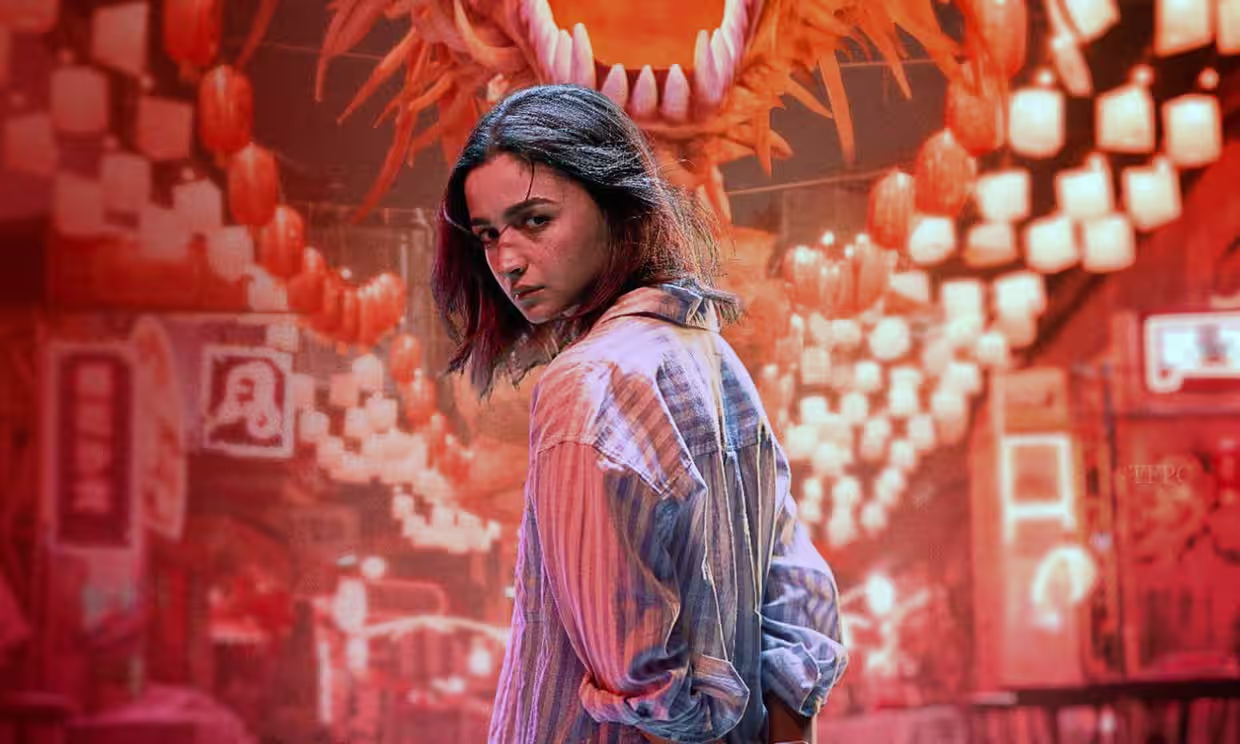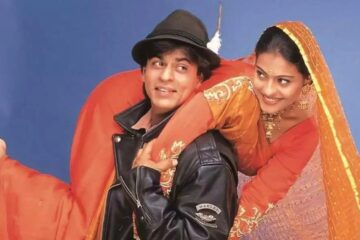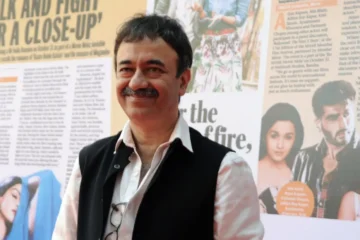While Jigra features some standout moments, particularly Alia Bhatt’s exceptional acting and the thrilling action scenes, the film’s disorganized plot and emphasis on aesthetics rather than depth detract from its overall effectiveness.
The beauty of storytelling is that you can flip the narrative on any given day and change the whole feel. Whether the result sits well with the audience is up to the strength of conviction of its leads. That’s what Jigra, the Alia Bhatt-starrer attempts to do. It’s a commendable effort, no doubt, but nothing that hasn’t been done before.
Having said that, though, heists, thrillers, and prison break dramas have conventionally been male-centric vehicles that rely on delivering fast-paced edge-of-the-seat thrills and engaging the audience with their impressive special effects. But cinema all over the world has been undergoing a pivot in terms of leading roles. For example, when Ocean’s 8 came out, there was a sense of disbelief among those who had grown to love the previous male-centric editions. That is to say that even though Ocean’s 8 eventually was critically and commercially successful, it was not a surefire thing right out of the gate. Thus, to achieve something new, you must have belief and conviction in your story; in other words, you need to have some jigra (a common term for courage and inner strength).
Does it deliver the goods?
Let’s find out.
What’s the Story About?
Jigra follows siblings Satya (played by Alia Bhatt) and Ankur (Vedang Raina), who, after witnessing their father take his own life, grew up in the care of affluent relatives. Later on, as an adult, Ankur finds himself facing execution for drug possession in the made-up nation of Hanshi Dao, prompting Satya to do whatever it takes to secure his freedom.
Unfazed by the harsh law enforcement that issues death penalties for drug-related crimes, she launches a bold quest to liberate him. She is accompanied by a hodge-podge of characters, such as Bhatia (Manoj Pahwa), a former gangster, and Muthu (Rahul Ravindran), an ex-police officer as Satya concocts a complex scheme to rescue four young men—including her brother Ankur—from jail after the legal system falls short of delivering justice.
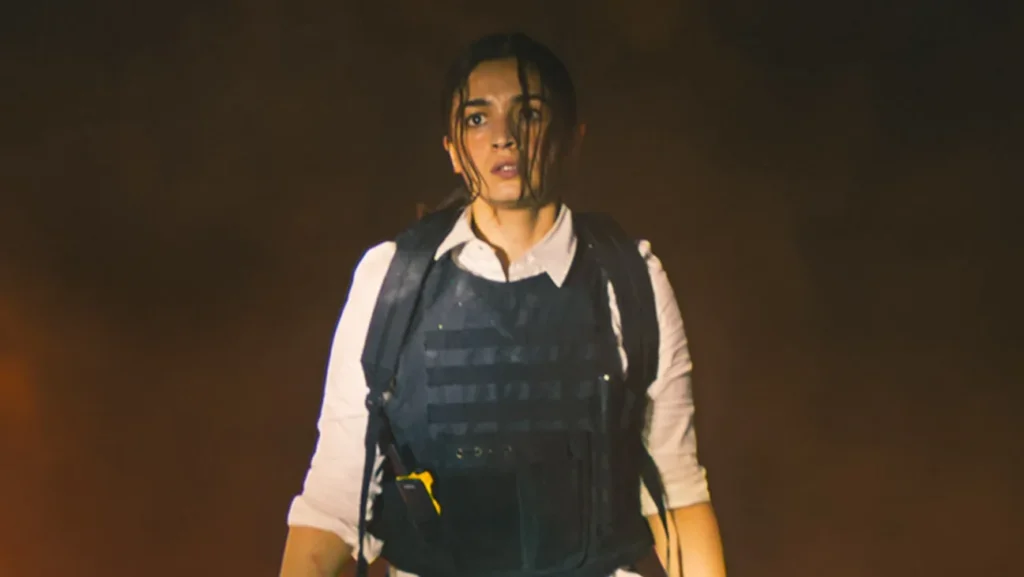
Sound Familiar?
Let’s get two things clear right from the start. Yes, it does sound a lot like the 1993 Sanjay Dutt and Sridevi starrer Gumrah — which, incidentally, was directed by Mahesh Bhatt, Alia Bhatt’s father. And no, it’s not a copy of the Divya Khossla starrer Savy, which was an unintentionally funny copy of The Next Three Days — which, believe it or not, was a remake of the 2008 French film. If your head’s spinning already, we don’t blame you. And to ensure that it doesn’t spin even more, may we suggest staying clear of ever watching Savy?
What Works in Jigra?
Plot-driven stories rely on intricately crafted stories, jaw-dropping special effects, and action sequences. While Jigra ‘s attempts at all of the above are commendable but nothing to write home about, the movie has something else up its sleeve. It relies on the formidable force of Alia Bhatt, and it works for the most part.
Not many in the industry can convey strength, fortitude, grief, and resolve all together in just one frame from their eyes. Frankly, at this point, the question should be, is there anything Alia Bhatt can’t do? Her character is molded on the classic Amitabh Bachchan archetype of the angsty orphan. Alia’s unconventional approach and lack of physicality surprisingly become her greatest assets, compelling us to believe in her journey. She shines in her dual role as both an action star and a passionate figure. She executes death-defying stunts with flair and masterfully conveys a spectrum of emotions—anger, helplessness, and resilience. As the protective sister, her portrayal is poignant, making the character’s deep-seated angst and determination in the action sequences both believable and moving.
They say any partnership is as good as its weakest member, and the same holds true in Jigra. Alia is helped by the ever-reliable Manoj Pahwa, who successfully injects a dose of humor into the story. While we’re not complaining, just as an aside, why do we need to have comic relief in an out-and-out thriller? Why can’t we move beyond having bits of everything in a single movie?
Vedang Raina performs admirably as the brother, delivering a solid performance, albeit with slight hiccups in more emotional sequences. The chemistry between the characters is genuine and tangible.
Another positive highlight is the background music. Far from mere accompaniment, the score is a pivotal force that amplifies every sentiment, from the quiet moments of connection to the explosive action scenes. It crescendos perfectly, steering viewers through the emotional peaks and valleys and enhancing the film’s immersive quality.
The editing of the film also warrants acclaim. It maintains a brisk pace, skillfully balancing emotional depth with thrilling suspense to keep viewers captivated from beginning to end. The seamless transitions, especially during intense sequences like the prison break, are noteworthy, keeping the audience fully engaged and connected to the narrative.
The film’s visual and action choreography are exceptional, thanks to cinematographer Swapnil S Sonawane and action director Vikram Dahiya. Their expertise shines in the sleek, well-choreographed stunts and action scenes, with standout moments like Satya navigating a sloping rooftop and dynamic pyrotechnic displays.
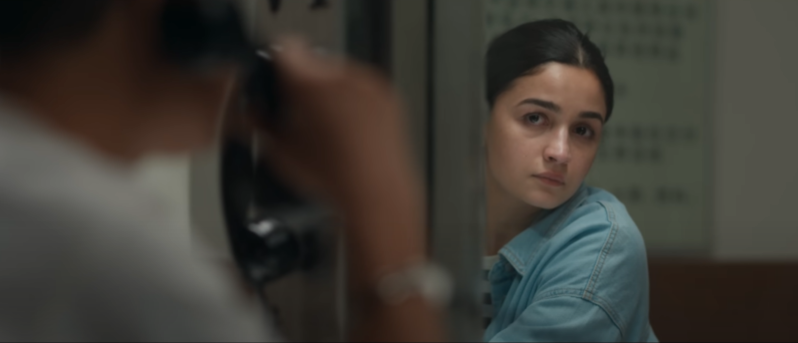
What Doesn’t Work?
Who doesn’t like jailbreak movies? Certainly not us. The concept behind Jigra definitely had cache and significant potential to explore the journey of a sister willing to make morally dubious choices against a rigid foreign legal system. Unfortunately, what could have been a captivating and inspiring narrative soon descends into disorder. The script, penned by Bala and Debashish Irengbam, turns flat and overly focuses on flashy action rather than depth. Additionally, a secondary plot involving a prison escape further complicates the story. This disorderly approach and emphasis on aesthetics over substance detract from the film’s impact. A more focused storyline and a robust premise could have significantly enhanced the movie.
Another weakness was the fuzzy dynamics between Satya and her companions. They seem like half-sketched caricatures rather than fully-formed characters. Manoj Pahwa’s character, Bhatia, a self-proclaimed retired gangster, seems tailor-made to resonate with the masses. His love for the Zanjeer soundtrack is a little too on the nose for our taste, though.
The narrative foundation is somewhat shaky; writers Debashish Irengbam and Vasan Bala create a fictional nation with extremely strict drug laws rather than exploring other scenarios for imprisoning Ankur with a death sentence.
The movie also suffers from erratic flows, and scenes are inconsistently interspersed with actions occurring elsewhere and at different times, making it difficult to discern whether they are flashbacks, flash-forwards, or purely imaginary.
The habit of adding too many ingredients to the pot comes to the fore again when an attempt to incorporate political elements through a resistance movement in Hanshi Dao is explained. The scene where a leader’s statue is toppled is familiar, yet it feels underexplored.
Speaking of unexplored areas, repeatedly, the film unnecessarily reiterates that Satya and Ankur witnessed their father’s suicide. This point is mentioned without any deeper exploration of its causes or impacts. Even the backstory detailing Satya and Ankur’s connection to their affluent guardians is briefly touched upon before disappearing entirely.
Final Verdict
Anyone familiar with the dynamics of having an older sister understands their formidable nature and protective instincts. The movie’s emotional heart resides in this sibling relationship, portrayed with both delicacy and intensity. Few actors can express resilience and determination through their gaze and gestures as effectively as Alia Bhatt. Watching her in moments where she’s both unyielding and commanding is captivating, while Raina skillfully portrays more tender emotions. Satya’s formidable presence perfectly captures how awe-inspiring older sisters appear to their younger siblings. As the plot develops, it beautifully illustrates the power of familial bonds and the extremes one might reach to safeguard them.
In many narratives, the brother typically plays the hero. Refreshingly, this film positions the sister in this protective role. Vasan Bala crafts a story that skillfully blends suspense, emotion, and drama. The slower pace allows the audience to engage with the characters and their circumstances fully. The depiction of the prison environment is notably intriguing.
While the final jailbreak scene leans towards the cinematic and could have been more nuanced, the action scenes are executed with a realism that enhances their credibility.
But if you watch Jigra for the action sequences and special effects, you’re missing the point. It’s a movie about love that will not bend, break, or run dry. Watch it for the ache of separation and injustice felt between siblings.
And then call up your sibling. Better still, watch it with them.
We give it a 3.5 out of 5

